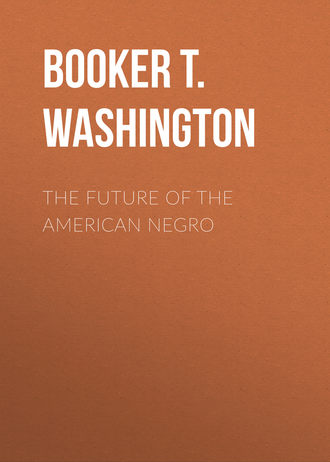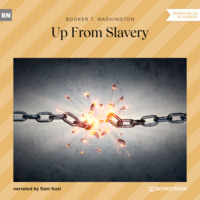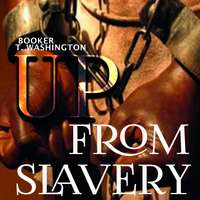 полная версия
полная версияThe Future of the American Negro
An important question often asked is, Does the white man in the South want the Negro to improve his present condition? I say, "Yes." From the Montgomery (Alabama) Daily Advertiser I clip the following in reference to the closing of a coloured school in a town in Alabama:—
"Eufaula, May 25, 1899."The closing exercises of the city coloured public school were held at St. Luke's A. M. E. Church last night, and were witnessed by a large gathering, including many white. The recitations by the pupils were excellent, and the music was also an interesting feature. Rev. R. T. Pollard delivered the address, which was quite an able one; and the certificates were presented by Professor T. L. McCoy, white, of the Sanford Street School. The success of the exercises reflects great credit on Professor S. M. Murphy, the principal, who enjoys a deservedly good reputation as a capable and efficient educator."
I quote this report, not because it is the exception, but because such marks of interest in the education of the Negro on the part of the Southern white people can be seen almost every day in the local papers. Why should white people, by their presence, words, and many other things, encourage the black man to get education, if they do not desire him to improve his condition?
The Payne Institute in Augusta, Georgia, an excellent institution, to which I have already referred, is supported almost wholly by the Southern white Methodist church. The Southern white Presbyterians support a theological school at Tuscaloosa, Alabama, for Negroes. For a number of years the Southern white Baptists have contributed toward Negro education. Other denominations have done the same. If these people do not want the Negro educated to a high standard, there is no reason why they should act the hypocrite in these matters.
As barbarous as some of the lynchings in the South have been, Southern white men here and there, as well as newspapers, have spoken out strongly against lynching. I quote from the address of the Rev. Mr. Vance, of Nashville, Tennessee, delivered before the National Sunday School Union in Atlanta, not long since, as an example:—
"And yet, as I stand here to-night, a Southerner speaking for my section, and addressing an audience from all sections, there is one foul blot upon the fair fame of the South, at the bare mention of which the heart turns sick and the cheek is crimsoned with shame. I want to lift my voice to-night in loud and long and indignant protest against the awful horror of mob violence, which the other day reached the climax of its madness and infamy in a deed as black and brutal and barbarous as can be found in the annals of human crime.
"I have a right to speak on the subject, and I propose to be heard. The time has come for every lover of the South to set the might of an angered and resolute manhood against the shame and peril of the lynch demon. These people, whose fiendish glee taunts their victim as his flesh crackles in the flames, do not represent the South. I have not a syllable of apology for the sickening crime they meant to avenge. But it is high time we were learning that lawlessness is no remedy for crime. For one, I dare to believe that the people of my section are able to cope with crime, however treacherous and defiant, through their courts of justice; and I plead for the masterful sway of a righteous and exalted public sentiment that shall class lynch law in the category with crime."
It is a notable and praiseworthy fact that no Negro educated in any of our larger institutions of learning in the South has been charged with any of the recent crimes connected with assaults upon females.
If we go on making progress in the directions that I have tried to indicate, more and more the South will be drawn to one course. As I have already said, it is not for the best interests of the white race of the South that the Negro be deprived of any privilege guaranteed him by the Constitution of the United States. This would put upon the South a burden under which no government could stand and prosper. Every article in our federal Constitution was placed there with a view of stimulating and encouraging the highest type of citizenship. To permanently tax the Negro without giving him the right to vote as fast as he qualifies himself in education and property for voting would work the alienation of the affections of the Negro from the States in which he lives, and would be the reversal of the fundamental principles of government for which our States have stood. In other ways than this the injury would be as great to the white man as to the Negro. Taxation without the hope of becoming a voter would take away from one-third the citizens of the Gulf States their interest in government and their stimulant to become tax-payers or to secure education, and thus be able and willing to bear their share of the cost of education and government, which now weighs so heavily upon the white tax-payers of the South. The more the Negro is stimulated and encouraged, the sooner will he be able to bear a larger share of the burdens of the South. We have recently had before us an example, in the case of Spain, of a government that left a large portion of its citizens in ignorance, and neglected their highest interests.
As I have said elsewhere, there is no escape through law of man or God from the inevitable:—
"The laws of changeless justice bindOppressor with opprest;And, close as sin and suffering joined,We march to fate abreast.""Nearly sixteen millions of hands will aid you in pulling the load upward or they will pull against you the load downward. We shall constitute one-third and more of the ignorance and crime of the South or one-third its intelligence and progress. We shall contribute one-third to the business and industrial prosperity of the South or we shall prove a veritable body of death, stagnating, depressing, retarding, every effort to advance the body politic."
My own feeling is that the South will gradually reach the point where it will see the wisdom and the justice of enacting an educational or property qualification, or both, for voting, that shall be made to apply honestly to both races. The industrial development of the Negro in connection with education and Christian character will help to hasten this end. When this is done, we shall have a foundation, in my opinion, upon which to build a government that is honest and that will be in a high degree satisfactory to both races.
I do not suffer myself to take too optimistic a view of the conditions in the South. The problem is a large and serious one, and will require the patient help, sympathy, and advice of our most patriotic citizens, North and South, for years to come. But I believe that, if the principles which I have tried to indicate are followed, a solution of the question will come. So long as the Negro is permitted to get education, acquire property, and secure employment, and is treated with respect in the business or commercial world,—as is now true in the greater part of the South,—I shall have the greatest faith in his working out his own destiny in our Southern States. The education and preparing for citizenship of nearly eight millions of people is a tremendous task, and every lover of humanity should count it a privilege to help in the solution of a great problem for which our whole country is responsible.
1
November, 1898.




